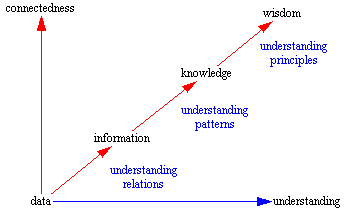Formulating Questions
The character of the questions we ask greatly influences the
appropriateness of the answers we develop. If we ask short sighted
questions should we be surprised if we develop short sighted answers?
I would think not.
The following diagram provides a perspective on the relation
of data, information, knowledge, and wisdom. As we describe situations
and seek understanding further up this path we develop a foundation
for subsequently more effective actions. Actions which are more
likely to produce the desired results, and less likely to simply
create more problems to be solved.

To improve the character of the questions we ask it is important
to transcend the levels in the above diagram. If we ask questions
that allow data to be an answer that is what we will get. If we
ask questions regarding relations, i.e. cause and effect, then
we will find, or make up, causes as answers to the questions we
pose. When we finally reach the level of asking questions that
cause us to seek out and understand the patterns responsible for
the situations we consider we finally arrive at answers that represent
knowledge. Finally when we ask questions which cause us to seek
the underlying fundamental principles that are responsible for
the patterns represented in the knowledge we are finally in a
position to develop answers that represent wisdom.
How you ask questions is a choice. Make of it what you will.
As such, when posing questions think about the manner in which
the situation has developed over time. Think about the relationships
between the components that make up the situation, and how have
these relationships developed over time. Consider the following
as two alternative perspectives on the same situation.
- Sales are down.
- As monthly sales volumes were somewhat less than desirable
a rebate program was implemented. The rebate program seemed to
work as shortly after its implementation sales began to increase.
When sales reached an acceptable level the rebate program was
discontinued. After some time sales began to decline again. Another
rebate program was implemented but did not seem to have the same
level of effect on sales as the previous program. With higher
levels of rebate sales were returned to an acceptable level.
Now that the rebate program has been stopped sales are again
down and we're uncertain as to whether implementing another rebate
program is an appropriate action.
Items 1 and 2 both describe the same current state, "Sales
are down." In an attempt to determine an appropriate course
of action for the future, which set of information do you think
provides you with the best starting point from which to develop
an answer? The answer to this question should be rather obvious.
theWay of Systems
* Feedback
* Musings
Copyright © 2004 Gene Bellinger
|